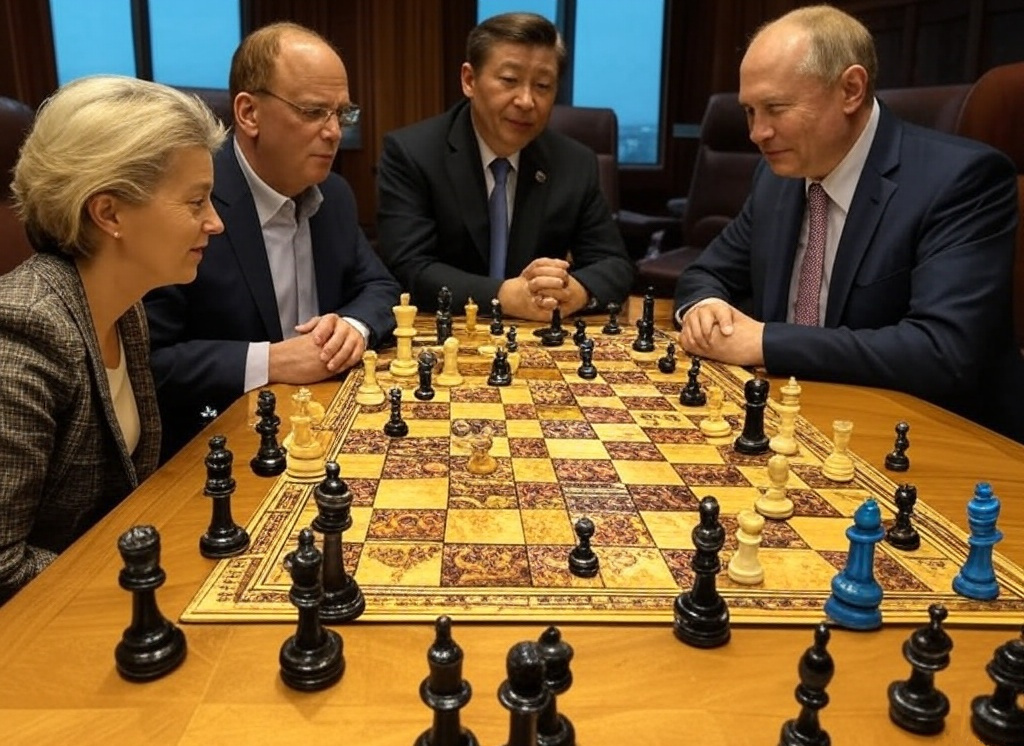
Arms manufacturers are the big winners of the tumultuous events in the public-facing citadels of power across the Western world over the last couple of weeks. Just as the new White House administration tried to broker a peace deal with Russia over the three-year old war over Eastern Ukraine, Ursula von der Leyen’s EU and Sir Keir Starmer’s UK have announced the biggest increase in military spending since the fall of the former Soviet Union. Their carefully choreographed pronouncements elicit disturbing levels of self-righteous groupthink that tolerate no dissent from unconditional support for Zelensky’s regime.
If you disagree with the transfer of hundreds of billions of € to the Military Industrial Complex, you are, in the closed minds of mainstream groupthinkers, a traitor to their warped vision of liberal democracy, which means compliance with the emerging corporate dictatorship of BlackRock, Vanguard, the ECB and insidious NGOs. Any divergence from the new party line, as promoted indefatigably by all the main media outlets around Europe, is predictably labelled either pro-Putin or far-right.
The same nefarious operators who had so successfully persuaded successive US administrations to squander trillions of dollars on disastrous regime-change wars had apparently moved shop to a more bellicose Europe. When it came to Iraq and Afghanistan, the gut feeling of most ordinary Europeans was to steer clear of foreign conflicts and limit any intervention to humanitarian aid and arms embargoes. The French and German governments both distanced themselves from the US/UK-led invasion of Iraq back in 2003. By contrast, Americans were much more receptive to the kind of blanket humanitarian war propaganda pumped out by CNN, Fox News, ABC, CBS and MSNBC, especially if the actions of a foreign regime posed a threat to Israel, evoking memories of the Holocaust.
Since 9/11, the spectre of international terrorism has justified most military adventures. Alas, the Ukraine-Russia war evokes deep-seated emotions among millions of Europeans that stem from the tumult and troubled outcomes of the World Wars and 45 years of Soviet repression of national identities. The peoples of Poland, Lithuania, Latvia, Estonia and Finland have longstanding grudges against Russia for its past invasions of their countries before and after the 1917 Bolshevik Revolution, while the citizens of most other former Warsaw Pact countries looked west after the fall of the Iron Curtain. Elsewhere in Europe, while the Cold War shaped feelings toward Russia before 1991, tensions have only recently resurfaced with an intriguing twist.
For the best part of two decades in the absence of ideological clashes, it seemed Russia would eventually fully integrate with the rest of Europe, but rather than follow the West’s newfound love of postmodern woke ideology, Russia became a bastion of social conservatism. Back in the 1960s and 70s, left-wing radicals were much more likely to sympathise with the USSR than socially conservative Christians and the patriotic working classes. When the Labour Party under Michael Foot advocated unilateral nuclear disarmament in the 1983 general election, its vote plummeted to a post-war low, despite industrial decline, high unemployment and shoddy public services.
Yet today’s most outspoken opponents of resurgent Russia under Vladimir Putin are affluent trendy lefties, including Germany’s outgoing Green foreign minister, Analena Baerbock, who's party campaigned in the 1980s against Pershing nuclear missiles on German soil, even at the expense of preventing their country’s reunification, which still seemed a distant prospect before the Peaceful Revolution (Friedliche Revolution) against Erich Honecker’s stubborn refusal to follow Gorbachev’s liberalisation process of greater openness and transparency known as Glasnost.
This was in stark contrast to neighbouring Poland, where in 1981 around a million workers in the Solidarity movement went on strike, forcing General Wojciech Jaruzelski to declare martial law and send in tanks to suppress protests. Future historians will try to explain how an environmentalist organisation that opposed both mass consumerism and militarism in the 1980's could become one of the most fervent proponents of European rearmament and the Fourth Industrial Revolution in unison with the big banking cartels.
The only common thread that links the old Greens of the 1980's to the new global governance enthusiasts is their opposition to nuclear power, but that may well perfectly align with the World Economic Forum’s plans to shift manufacturing away from cars, household appliances and disposable gadgets to AI-enhanced drones, digital services and genetic engineering, leading us to a near future with well-paid jobs only for the best and brightest and everyone else on Universal Basic Income.
Is the West at war with itself?
The United States has been the guiding force behind the Western alliance since its inception in the aftermath of World War Two, accounting for 68-70% of NATO’s combined military expenditure. Its other member states would literally have to triple their defence budgets to make up in its absence.
Yet NATO lost on the battle ground despite a much larger military outlay as measured in euros. Russia’s military spending may have doubled, but it’s still lower in dollar terms than French and British defence budgets combined. They’re clearly getting much better value for their money and invested in the right technologies, such as drones and hypersonic missiles, to neutralise their opponents.
As long as Russia can defend its control of its vast mineral and fossil fuel resources, it holds all the trump cards with a growing market in India and China. Since the disastrous Yeltsin years of gangster capitalism opening up Siberia’s vast resources to Western multinationals enriching only a handful of oligarchs, the Russian government strategy has been to regain and retain control of its natural assets. The linguistic and religious rights of the inhabitants of the disputed territories is a sideshow and could have been easily accommodated within a neutral but independent Ukraine with regional autonomy.
There are significant Russian-speaking minorities in Kazakhstan, Belarus, Kyrgyzstan, Uzbekistan, Latvia and Lithuania. Indeed, in Kazakhstan and Belarus, Russian is, de facto, the dominant lingua franca. Western sanctions ended up hurting the West more than Russia. They succeeded only in driving up energy prices in Europe, stemming Russia’s brain drain, boosting its domestic manufacturing capabilities and strengthening its economic ties with China.
Meanwhile, Atlanticist Europeans like Guy Verhofstadt, Friedrich Merz and Emmanuel Macron appear to be at loggerheads with the Trump administration over Ukraine, while also strategically distancing themselves from the US State Department’s steadfast support for Israeli bombing raids over Gaza, the West Bank, Syria and Yemen.
Why is Ukraine so important for European elites, while the White House now seems much more concerned with Israeli security? How could senior advisors let the President suggest the annexation of Canada and Greenland, both allegedly close allies, while Canada’s new banker Prime Minister, Mark Carney, pivots to the European axis? May I suggest this is all a big charade to get the European wing of the Global Empire to rearm on a massive scale, while the much-maligned Trump/Musk/Netanyahu axis diverts all available military resources to fight Israel’s dirty wars.
The Ukraine quagmire may end with BlackRock controlling much of its prime farmland and copious mineral deposits, while Russia keeps Crimea and the breakaway Eastern regions. However, in a weird inversion of objective reality, more and more young Europeans will look east rather than west for the promise of personal freedom and democracy built around strong families and social cohesion.
It’s now becoming painfully obvious to all but the most dim-witted or intellectually dishonest observers, that the European elites personified by Starmer, Merz and Macron, hate their own people. Both the ideological left and the socially conservative right hate Starmer, but the rot started much earlier.
As if squandering £450 billion on the covid psyop was not enough, Starmer has doubled down spending tens of billions more on military adventurism and global grandstanding. Millions placed their trust in Labour to save the welfare state, invest in education, cut the NHS waiting list and care for the most vulnerable in society, yet with rising unemployment and long-term worklessness, the government is about to slash disability benefits calling on over 1 million working age adults, mainly with ill-defined mental health issues, to get off their backbones and work. Successive administrations got people hooked on welfare and now they’re pulling the plug just as they fast-track the assisted dying bill with relaxed safeguards for sufferers of emotional distress.
With the government still spending upwards of £6 billion on temporary accommodation for undocumented immigrants, the stage is set for social unrest bordering on civil war.









